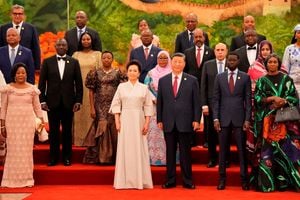
Kenya was put on the money laundering grey list early this year by the Financial Action Task Force.
“Kenya must exit the grey list”. Those were the words of former Treasury and National Planning Cabinet Secretary Prof Njuguna Ndung’u in the handing over notes he presented to his successor John Mbadi last week.
Prof Ndung’u also disclosed that the Gates Foundation was funding a leading American security think tank-—Financial Services Security Volunteer Corps (FSCV)—to support our own Financial Reporting Centre (FRC) to help us exit the grey list.
As we all know, Kenya was put on the money laundering grey list early this year by the Financial Action Task Force (FATF), the global body that monitors and enforces compliance to international money laundering and terrorism financing standards. We were given 15 action points by FAFT to meet before our name could be removed from the list of shame.
Compliance to international money laundering standards in this country is the responsibility of the little-known Nairobi financial intelligence unit FRC.
Prof Ndungu’s urged Mr Mbadi to make exit from the grey list a top agenda, disclosing that Treasury had engaged both the Gates Foundation and the New York- headquartered FSVC to provide technical assistance to FRC on enhancing its counter terrorism capacity.
I am not opposed to technical assistance. But If I were the one making decisions at Treasury, I would not allow these Western security think tanks anywhere near the operations of our financial intelligence authority. Intelligence is a core State function that we should not be too ready to outsource to these creepy think tanks because the issues at stake touch on national sovereignty.
Counter-terrorism
Is it not the height of absurdity that we are drawing on Western think tanks to shape the central planks of our national counter-terrorism agenda? The consultants are not being hired for a specialised or technical work, but rather to help shape the direction and purpose of this important State financial security agency.
If you have been following the goings-on around the politics of FATF and on the subject of illicit financial flows and terrorism financing, you will have heard of the pressures that FRC has been going through from Western think tanks and security agencies pretending to offer technical assistance, when their real motive is to access financial intelligence data.
FRC has data on all banking transactions beyond Sh 1 million. Today, even high money laundering risk sectors such as real estate and law firms are legally obligated to report all large transactions to the FRC.
Here is a true story I gathered from an impeccable source and knowledgeable player in this space.
Sometime last year, the United Kingdom’s security think tank Royal United Services Institute (RUSI) approached the FRC for a meeting to discuss a research report it had conducted on illicit flows into Kenya’s real estate sector.
FRC refused to oblige on the grounds that the country was at that time in the middle of preparing to defend itself before FATF. According to my source, FRC felt that the UK think tank was merely seeking data to validate the research they had conducted and that centred on the presumption of a recent upsurge in investment in Nairobi’s real estate sector by Al-Shabaab.
The results of the study are yet to be released by RUSI after the National Counter Terrorism Control Centre cautioned the UK think tank about research protocol breaches.
I also gather that FRC is currently inundated with offers for technical assistance from all manner of Western think tanks and not-for-profit entities, some of them funded by Western military establishments.
Policy issues
There are broader policy issues here. The growth of consultancy spending has hit the roof. Last week, Prof Ndung’u also disclosed that the Danish government was funding a tax policy and tax instruments policy review study for us.
I ask: Why not channel those funds to the taxpayer-funded Kenya Institute for Public Policy Research and Analysis (KIPPRA)? The State’s reliance on consultants for advice has ballooned to absurd proportions.
I am usually not in the habit of invoking patriotism. We were taught in journalism school that patriotism is the last refuge of a scoundrel. Yet, I always find myself standing at attention—almost involuntarily—whenever I hear the sound of that whistle announcing the lowering of the national flag at some government building. It is the same way I feel when I see our athletics hero Beatrice Chebet lapping some pitiable-looking Anglo-Saxon athlete over and over on her way to winning the Olympic 5000m gold medal.
Even as we seek technical assistance, on matters touching on national sovereignty, let’s show some patriotism.










